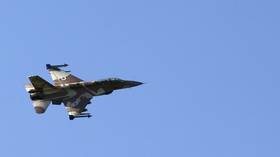US forced Israel to abandon larger attack on Iran – NYT

Israeli leaders planned a “much more extensive counterstrike on Iran” after Tehran launched a drone and missile barrage on Israel last weekend, but were pressured to pare down the operation by the US and its allies, the New York Times reported on Monday.
Israel targeted Iran with a handful of drones and air-launched missiles on Friday, according to US officials and anonymous Israeli sources who spoke to the newspaper. While Western officials believe that an Israeli missile hit an Iranian airbase, Tehran has only acknowledged being attacked with small quadcopter drones, with Foreign Minister Hossein Amirabdollahian describing the aircraft as “children’s toys” that were easily shot down.
West Jerusalem initially intended a much wider wave of strikes targeting military sites across the country, including near Tehran, anonymous Israeli officials told the outlet. However, the US, UK, and Germany exerted “concerted diplomatic pressure” on Israeli Prime Minister Benjamin Netanyahu and forced him to settle for a more limited response, the officials said.
Such a response “avoided significant damage, diminishing the likelihood of an escalation,” the New York Times reported.
The Israeli military has not commented on the report, and has stuck to its usual policy of refusing to confirm or deny strikes on foreign soil.
The latest round of escalation between Israel and Iran began on April 1, when an Israeli airstrike allegedly hit the Iranian consulate in the Syrian capital of Damascus. The strike killed seven officers of the Islamic Revolutionary Guard Corps (IRGC) Quds Force, including two high-ranking generals.
Tehran warned that it would retaliate, and two weeks later launched multiple waves of missiles and kamikaze drones at Israel. Most of the Iranian projectiles were intercepted, but with more than 300 drones fired, air defenses were overwhelmed and multiple missiles reached their target, damaging an Israeli air base.
Netanyahu initially planned immediate retaliatory strikes, but was talked out of it during a phone call with US President Joe Biden, the New York Times reported last week. In both last week’s report and Monday’s, Israeli and American officials stressed that Washington wanted West Jerusalem to avoid provoking Iran into an escalating series of tit-for-tat strikes and counterstrikes.
The plan appears to have succeeded. “As long as there is no new adventurism by Israel against our interests, then we are not going to have any new reactions,” Amirabdollahian stated on Saturday.
With some of Netanyahu’s hardline political allies criticizing the supposedly “lame” response, the officials who spoke to the New York Times insisted that the strikes demonstrated “the breadth and sophistication of Israel’s military arsenal,” the paper paraphrased.














